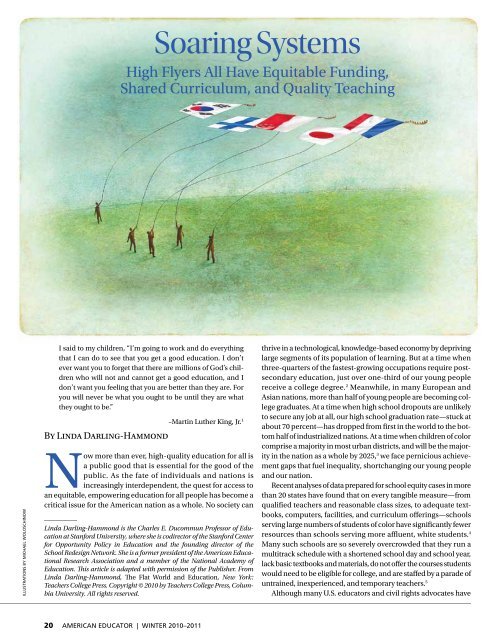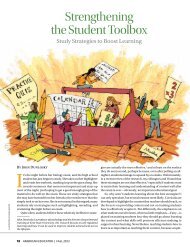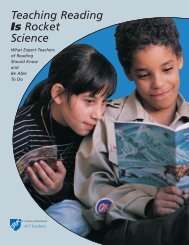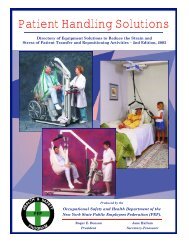American Educator, Winter 2010-11, Vol. 34, No. 4, AFT
American Educator, Winter 2010-11, Vol. 34, No. 4, AFT
American Educator, Winter 2010-11, Vol. 34, No. 4, AFT
Create successful ePaper yourself
Turn your PDF publications into a flip-book with our unique Google optimized e-Paper software.
ILLUSTRATIONS BY MICHAEL WOLOSCHINOW<br />
Soaring Systems<br />
High Flyers All Have Equitable Funding,<br />
Shared Curriculum, and Quality Teaching<br />
I said to my children, “I’m going to work and do everything<br />
that I can do to see that you get a good education. I don’t<br />
ever want you to forget that there are millions of God’s children<br />
who will not and cannot get a good education, and I<br />
don’t want you feeling that you are better than they are. For<br />
you will never be what you ought to be until they are what<br />
they ought to be.”<br />
By Linda Darling-Hammond<br />
20 AMERICAN EDUCATOR | WINTER <strong>2010</strong>–20<strong>11</strong><br />
–Martin Luther King, Jr. 1<br />
<strong>No</strong>w more than ever, high-quality education for all is<br />
a public good that is essential for the good of the<br />
public. As the fate of individuals and nations is<br />
increasingly interdependent, the quest for access to<br />
an equitable, empowering education for all people has become a<br />
critical issue for the <strong>American</strong> nation as a whole. <strong>No</strong> society can<br />
Linda Darling-Hammond is the Charles E. Ducommun Professor of Education<br />
at Stanford University, where she is codirector of the Stanford Center<br />
for Opportunity Policy in Education and the founding director of the<br />
School Redesign Network. She is a former president of the <strong>American</strong> Educational<br />
Research Association and a member of the National Academy of<br />
Education. Th is article is adapted with permission of the Publisher. From<br />
Linda Darling-Hammond, Th e Flat World and Education, New York:<br />
Teachers College Press. Copyright © <strong>2010</strong> by Teachers College Press, Columbia<br />
University. All rights reserved.<br />
thrive in a technological, knowledge-based economy by depriving<br />
large segments of its population of learning. But at a time when<br />
three-quarters of the fastest-growing occupations require postsecondary<br />
education, just over one-third of our young people<br />
receive a college degree. 2 Meanwhile, in many European and<br />
Asian nations, more than half of young people are becoming college<br />
graduates. At a time when high school dropouts are unlikely<br />
to secure any job at all, our high school graduation rate—stuck at<br />
about 70 percent—has dropped from fi rst in the world to the bottom<br />
half of industrialized nations. At a time when children of color<br />
comprise a majority in most urban districts, and will be the majority<br />
in the nation as a whole by 2025, 3 we face pernicious achievement<br />
gaps that fuel inequality, shortchanging our young people<br />
and our nation.<br />
Recent analyses of data prepared for school equity cases in more<br />
than 20 states have found that on every tangible measure—from<br />
qualified teachers and reasonable class sizes, to adequate textbooks,<br />
computers, facilities, and curriculum off erings—schools<br />
serving large numbers of students of color have signifi cantly fewer<br />
resources than schools serving more affluent, white students. 4<br />
Many such schools are so severely overcrowded that they run a<br />
multitrack schedule with a shortened school day and school year,<br />
lack basic textbooks and materials, do not off er the courses students<br />
would need to be eligible for college, and are staff ed by a parade of<br />
untrained, inexperienced, and temporary teachers. 5<br />
Although many U.S. educators and civil rights advocates have





